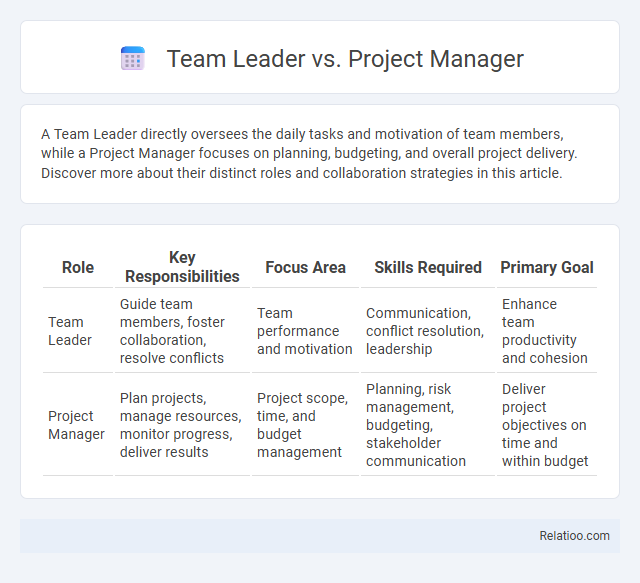A Team Leader directly oversees the daily tasks and motivation of team members, while a Project Manager focuses on planning, budgeting, and overall project delivery. Discover more about their distinct roles and collaboration strategies in this article.
Table of Comparison
| Role | Key Responsibilities | Focus Area | Skills Required | Primary Goal |
|---|---|---|---|---|
| Team Leader | Guide team members, foster collaboration, resolve conflicts | Team performance and motivation | Communication, conflict resolution, leadership | Enhance team productivity and cohesion |
| Project Manager | Plan projects, manage resources, monitor progress, deliver results | Project scope, time, and budget management | Planning, risk management, budgeting, stakeholder communication | Deliver project objectives on time and within budget |
Understanding the Roles: Team Leader vs Project Manager
Team Leaders focus on guiding and motivating team members to achieve specific tasks, emphasizing interpersonal skills and day-to-day team coordination. Project Managers oversee project planning, execution, and delivery, managing scope, budget, timelines, and stakeholder communication to ensure project success. Understanding the distinction clarifies responsibilities: Team Leaders manage people and team dynamics, while Project Managers handle broader project objectives and resource allocation.
Key Responsibilities of a Team Leader
A Team Leader is primarily responsible for guiding, motivating, and managing the team's daily activities to achieve specific project goals, ensuring effective communication and collaboration among team members. Unlike a Project Manager who oversees the entire project lifecycle including planning, budgeting, and stakeholder management, the Team Leader focuses on monitoring progress, providing technical support, and resolving conflicts within the team. Your role as a Team Leader involves fostering a productive work environment and driving team performance to meet deadlines and quality standards.
Core Duties of a Project Manager
The core duties of a Project Manager revolve around planning, executing, and closing projects while ensuring they meet scope, time, and budget constraints. Unlike a Team Leader who focuses on guiding a specific team and fostering collaboration, the Project Manager handles resource allocation, risk management, and stakeholder communication across multiple teams. Your success in project delivery depends on mastering these comprehensive responsibilities to achieve strategic objectives efficiently.
Leadership Styles: Team Leader and Project Manager Compared
Team leaders typically adopt a transformational leadership style, motivating and inspiring their team through vision and personal influence, fostering collaboration and growth. Project managers often employ a transactional leadership approach, focusing on structure, task assignments, and performance monitoring to ensure project goals are met on time and within budget. Your effective leadership depends on understanding these distinctions and applying the appropriate style to guide team dynamics and project execution successfully.
Decision-Making: Who Takes the Lead?
Decision-making authority differs between a Team Leader, Project Manager, and their respective roles, with the Project Manager steering overall project decisions and resource allocations, while the Team Leader focuses on tactical decisions and team coordination. Your role influences how much autonomy you have in making daily operational choices versus strategic project directions. Clear boundaries in decision-making ensure efficient leadership and project success.
Communication Skills in Both Roles
Effective communication skills are essential for both Team Leaders and Project Managers, enabling them to clearly convey goals, expectations, and project updates. Team Leaders focus on direct interpersonal communication to motivate and guide team members, while Project Managers prioritize stakeholder communication, ensuring alignment across all project phases. Mastery of active listening, conflict resolution, and transparent information sharing enhances team collaboration and project success in both roles.
Conflict Resolution: Different Approaches
Team Leaders focus on direct conflict resolution by fostering open communication and mediating disputes among team members to maintain cohesion. Project Managers address conflicts by aligning resolution strategies with overall project goals and stakeholder expectations, often involving structured escalation processes. The Role of each position shapes their approach: Team Leaders prioritize interpersonal dynamics, while Project Managers emphasize resource allocation and timeline impacts.
Required Skills and Competencies
A Team Leader requires strong interpersonal skills, conflict resolution abilities, and motivational expertise to effectively guide and support their team. A Project Manager must possess advanced organizational skills, risk management capabilities, and proficiency in project planning tools to ensure project objectives are met on time and within budget. Your success depends on understanding that while both roles demand leadership, the Project Manager focuses more on strategic oversight and resource allocation, whereas the Team Leader emphasizes day-to-day team performance and communication.
Career Progression: Team Leader vs Project Manager
Career progression from Team Leader to Project Manager involves a shift from managing daily team tasks to overseeing entire projects, including planning, execution, and stakeholder communication. Your advancement depends on developing strong leadership skills, strategic thinking, and project management knowledge, often validated by certifications like PMP or PRINCE2. Understanding the distinct roles helps you tailor your skills towards either motivating teams or driving project success for enhanced career growth.
Choosing the Right Role for Your Career Path
Choosing the right career path involves understanding key differences between a Team Leader, Project Manager, and Role-specific positions. Team Leaders focus on guiding and motivating team members to achieve daily objectives, while Project Managers oversee the planning, execution, and completion of projects within scope, time, and budget constraints. Selecting the appropriate role depends on your strengths in people management, strategic planning, or specialized technical skills aligned with long-term career goals.

Infographic: Team Leader vs Project Manager
 relatioo.com
relatioo.com